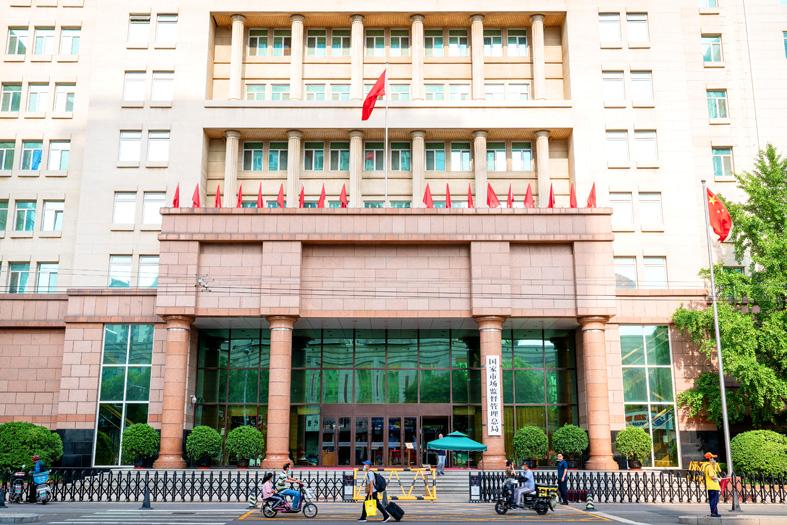China is about to draft new laws on national security, technology innovation, monopolies and education, as well as in areas involving foreigners, the Chinese government said in a document published late on Wednesday.
The announcement signals that a crackdown on industry with regard to privacy, data management, antitrust and other issues would persist throughout the year.
The Chinese Communist Party and the government said in a plan for the five years to 2025, published by the state-run Xinhua news agency, that they would also improve legislation governing public health by amending China’s infectious disease law, and its “frontier health and quarantine law.”

Photo: Bloomberg
China is working for a return to normal after the COVID-19 pandemic, which emerged in Wuhan in late 2019.
Regulations dealing with food and medicine, natural resources, industrial safety, urban governance and transport would also be strictly enforced, the government said.
Authorities aim to develop laws consistent with new sectors, such as the digital economy, Internet finance, artificial intelligence, big data and cloud computing, they said, adding that they would also improve the response to emergencies.
They also laid out directives for the prevention and resolution of social conflicts, and reiterated an order for officials to “nip conflicts in the bud.”
Better legislation in areas such as education, race, religion and biosecurity is also being planned, they said.
The government has over the past few months reined in tech corporations with anti-monopoly or data security rules, and clamped down on tutoring companies, as the state increases its control of the economy and society.
Authorities last month used a law aimed at responding to foreign sanctions for the first time to countersanction former US secretary of commerce Wilbur Ross and other US citizens, and last year imposed a National Security Law on Hong Kong, employing legal means to protect the Chinese government’s interests beyond the mainland border.
The party and the government asserted that a “rule of law government” must follow the party leadership.
Chinese President Xi Jinping (習近平) has made “rule of law governance” a signature of his rule, which would be extended if he seeks a third five-year term next year.

NATIONAL SECURITY THREAT: An official said that Guan Guan’s comments had gone beyond the threshold of free speech, as she advocated for the destruction of the ROC China-born media influencer Guan Guan’s (關關) residency permit has been revoked for repeatedly posting pro-China content that threatens national security, the National Immigration Agency said yesterday. Guan Guan has said many controversial things in her videos posted to Douyin (抖音), including “the red flag will soon be painted all over Taiwan” and “Taiwan is an inseparable part of China,” while expressing hope for expedited “reunification.” The agency received multiple reports alleging that Guan Guan had advocated for armed reunification last year. After investigating, the agency last month issued a notice requiring her to appear and account for her actions. Guan Guan appeared as required,

A Vietnamese migrant worker yesterday won NT$12 million (US$379,627) on a Lunar New Year scratch card in Kaohsiung as part of Taiwan Lottery Co’s (台灣彩券) “NT$12 Million Grand Fortune” (1200萬大吉利) game. The man was the first top-prize winner of the new game launched on Jan. 6 to mark the Lunar New Year. Three Vietnamese migrant workers visited a Taiwan Lottery shop on Xinyue Street in Kaohsiung’s Gangshan District (崗山), a store representative said. The player bought multiple tickets and, after winning nothing, held the final lottery ticket in one hand and rubbed the store’s statue of the Maitreya Buddha’s belly with the other,

‘NATO-PLUS’: ‘Our strategic partners in the Indo-Pacific are facing increasing aggression by the Chinese Communist Party,’ US Representative Rob Wittman said The US House of Representatives on Monday released its version of the Consolidated Appropriations Act, which includes US$1.15 billion to support security cooperation with Taiwan. The omnibus act, covering US$1.2 trillion of spending, allocates US$1 billion for the Taiwan Security Cooperation Initiative, as well as US$150 million for the replacement of defense articles and reimbursement of defense services provided to Taiwan. The fund allocations were based on the US National Defense Authorization Act for fiscal 2026 that was passed by the US Congress last month and authorized up to US$1 billion to the US Defense Security Cooperation Agency in support of the

CLASSIFIED BRIEFING: The ministry said the special budget focuses on building a comprehensive defense system and strengthening the domestic defense industry The Ministry of National Defense yesterday released information on seven categories of weapons systems to be procured under a stalled NT$1.25 trillion (US$39.57 billion) special defense budget, including precision artillery, long-range missiles, air defense anti-tank missiles and more than 200,000 uncrewed aerial vehicles (UAVs). The Executive Yuan approved a draft version of the budget on Nov. 27 last year and submitted it to the legislature for review. The legislature’s Foreign Affairs and National Defense Committee yesterday invited Minister of National Defense Wellington Koo (顧立雄) to deliver a classified briefing and answer questions at a closed-door session. Koo said he hoped to provide lawmakers